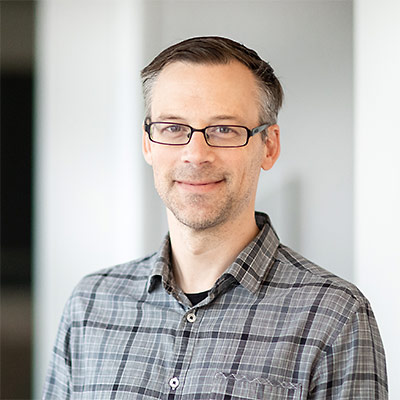Glauben became a tireless advocate for the 55,000-square-foot, $78 million Dallas Holocaust and Human Rights Museum, which opens to the public on Sept. 18.
“The younger generation, they have to remember,” Kaufman says of the Holocaust, while turning to a newly installed portrait of himself at the USC Fisher Museum of Art. “Those people, they looked up at me and said: ‘If you survive, don’t let them forget us.’”
Swedish History Museum’s first-ever Holocaust exhibit a success
Early this year, when the Swedish History Museum opened its exhibit about the Holocaust – an exhibit that includes USC Shoah Foundation testimonies and some of its interactive biographies – it marked the state-funded museum’s first foray into the topic.
The exhibit has been a major success, say two Swedish museum professionals who played a prominent role in the installation, and who came to USC Shoah Foundation’s headquarters in Los Angeles last week to discuss taking the partnership to the next level.
Shusenjo: The Main Battleground for the Comfort Women Issue
The “comfort women” issue is perhaps Japan’s most contentious present-day diplomatic quandary. Inside Japan, the issue is dividing the country across clear ideological lines. Supporters and detractors of “comfort women” are caught in a relentless battle over empirical evidence, the validity of oral testimony, the number of victims, the meaning of sexual slavery, and the definition of coercive recruitment. Credibility, legitimacy and influence serve as the rallying cry for all those involved in the battle.
Shabbiha: Assad’s Paramilitaries and Mass Violence in Syria
This lecture offers an examination of pro-state paramilitary violence in the Syrian conflict. It analyzes the emergence and transformation of pro-state paramilitarism in Syria in the context of the uprising and civil war. It focuses on the Syrian government’s deployment of the Shabbiha (later renamed ‘National Defense Forces’), irregular paramilitaries dressed in civilian gear and committing a broad spectrum of violence, including torture, kidnapping, assassination, sexual violence, and a string of massacres across the country.
What, exactly, is ‘Holocaust-related Music’?
USC Shoah Foundation Center for Advanced Genocide Research cosponsors this lecture, which is part of the Fall 2019 Hebrew Union College-USC Casden Institute Faculty and Graduate Student Research Seminar.
Call for Papers: The Future of Holocaust Testimonies: Preserving, Researching, and Re-Presenting Survivor’s Voices
Survivors and their testimonies have been central to Holocaust research and memorial culture. Even before the end of the Shoah, survivor historians in parts of Eastern Europe liberated from Nazi occupation collected testimonies and conducted interviews with fellow survivors.
These practices constituted an integral part in rebuilding lives, coping with trauma, and shaping collective memories (Laura Jockusch).
Call for Applications: 2020-2021 PhD Candidate Fellowships
The Center Awards Third Interdisciplinary Research Week Opportunity to International Team
Each year, the USC Shoah Foundation Center for Advanced Genocide Research hosts an interdisciplinary team of scholars from different universities and different countries for one week so that they can develop and discuss a collaborative innovative research project in the field of Holocaust and Genocide
USC Shoah Foundation and Discovery Education Award $10,000 in Scholarships and Prizes to 2019 ‘Stronger Than Hate Challenge’ Winners
In an effort to spark a social movement against hatred in all forms, USC Shoah Foundation, established by Steven Spielberg after his experience filming “Schindler’s List”— which gave voice to survivors and witnesses of the Holocaust and other genocides through education and action – and Discovery Education, today announced the Teaching with Testimony 2019 Stronger Than Hate Challenge
